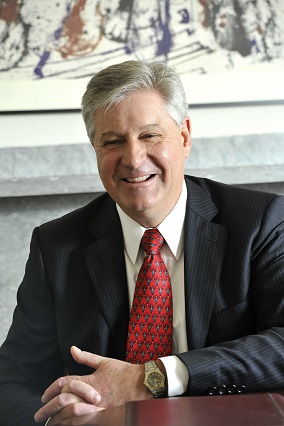
Faculty Archive
-
Daniel Hopkins says that, while today’s voters are more engaged in federal elections, they’ve pretty much abandoned state and local politics.
In a book that he’s developing, called The Increasingly United States, Hopkins, whose research as an associate professor of political science focuses on American elections and public opinion, says American federalism was based on the idea that voters’ primary political loyalties would be with the states. But that idea has become outdated.
-
2016 is turning out to be the most dangerous year in United States-Russia relations. Trust between the governments of the two countries is extinguished. The United States has sanctioned Russia for its annexation of Crimea and invasion of Eastern Ukraine. Russia has sent troops to Syria to prop up the government of Bashar al-Assad that the U.S. would like to see deposed. The U.S. is sending troops and equipment to Eastern Europe to bolster their defenses. Russia has unleashed a propaganda war against the U.S., spreading disinformation and stirring up anti-U.S.
-
David Wallace, Judith Rodin Professor of English, reads and comments on the prologue.
-
Rogers Smith, Christopher H. Browne Distinguished Professor of Political Science and Associate Dean for the Social Sciences, discusses the politics surrounding the Supreme Court nomination.
-
A panel of professors from the Department of Political Science discuss voting behavior and the nuances of the election process.
-
Ahead of the big game, we spoke with Errol Lord, assistant professor of philosophy, about the rationale behind fandom.
-
In a special podcast, we speak with Camille Zubrinsky Charles, Edmund J. and Louise W. Kahn Term Professor in the Social Sciences, professor of sociology, Africana Studies, and education, and Director of the Center for Africana Studies, about the holiday and the progression of social movements like Black Lives Matter.
-
In a special podcast, we spoke with professors Michael Weisberg and Paul Sniegowski about their experience with the case—and whether public attitudes on evolution have changed—as well as lead counsel and Penn Law graduate Eric Rothschild and presiding judge John E. Jones III.
-
Peter Decherney, professor of English and cinema studies, documents the challenges associated with making films in a country with an uncertain future.
-
Junhyong Kim and his collaborators pursue innovation in a sea of data.
-
Three Penn Arts and Sciences professors share their thoughts.
-
Tukufu Zuberi, Lasry Family Professor of Race Relations, examines African independence movements.
-
Racial Differences in Education's Impact on Net Worth
-

Steven J. Fluharty, Dean and Thomas S. Gates, Jr. Professor of Psychology, Pharmacology, and Neuroscience
Photo credit: Candace DiCarlo
-
The Continued Long-Term Consequences of Mass Incarceration in the United States
-
Poet and essayist Charles Bernstein, the Donald T. Regan Professor of English, has received the 2015 Janus Pannonius Grand Prize for Poetry, along with Giuseppe Conte
of Italy. -
Was an 18th-century automated harpsichord player the forerunner of the Terminator? They’re both mechanical humanoids and are often analyzed together, but Heidi Voskuhl, associate professor of history and sociology of science, suggests that they shouldn’t always be.
-
Penn Arts and Sciences welcomed 24 new members to its standing faculty for the 2015-2016 academic year. The appointments include seven professors, one visiting professor, two associate professors, and 14 assistant professors, in 17 departments spanning the humanities, social sciences, and natural sciences.
-
New Associate Professor of Political Science Daniel Hopkins received two awards from the American Political Science Association (APSA) this fall.
-
Before you set out for your next hike, make sure you bring sturdy boots, ample water, and an understanding of the cognitive underpinnings of your sense of direction.
In order to navigate successfully, your mind must work out two problems simultaneously: knowing your current location and understanding which direction you are facing. Most people think that locating themselves spatially is a single thought process, but the cognitive logistics are more complex than that, says Professor of Psychology Russell Epstein.


